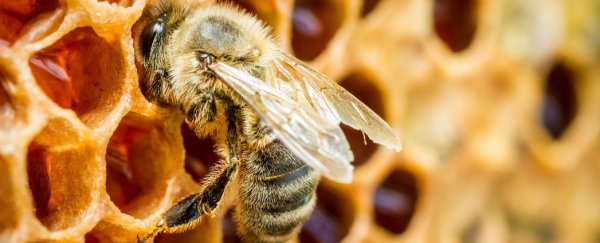In a new study looking into the effect of neonicotinoids insecticides - the most widely used class of insecticides on Earth - scientists have found that bees are getting hooked on them in much the same way that humans get addicted to the nicotine content in cigarettes.
Led by scientists from Newcastle Univeristy in the UK, the study found that bees are so attracted to neonicotinoids - which include synthetic chemicals similar to nicotine - that when offered a sugar solution laced with the insecticide, they choose it over a non-contaminated sugar solution. And evidence suggests that they also get a 'buzz' from it.
"Neonicotinoids target the same mechanisms in the bee brain that are affected by nicotine in the human brain," one of the team, neuroscientist Geraldine Wright, said in a press release. "The fact that bees show a preference for food containing neonicotinoids is concerning, as it suggests that like nicotine, neonicotinoids may act like a drug to make foods containing these substances more rewarding."
The team gathered together some buff-tailed bumblebees and honeybees and offered them a choice of regular sugar water - their favourite food - or sugar water laced with trace amounts of neonicotinoids. The amount they used in the lab mirrored the small amounts that end up on the flowering crops that both wild and farm bees are needed to fertilise.
Publishing their results in Nature, the team found that the bees actually preferred the contaminated sugar water when given both options, and it wasn't because they preferred the taste. "Investigation revealed that the insects are unable to taste the product, suggesting that the addictive properties of nicotine could play a significant role in their choice," James Maynard from Tech Times explains. "The lack of taste receptors for the insecticide also prevents bees from avoiding the chemicals, [which causes] further potential damage to colonies in the wild."
Favoured by massive corporations like Bayer and Syngenta, neonicotinoids are currently used on about 95 percent of corn and canola crops around the world, and are the most commonly used insecticide when it comes to cotton, sorghum, and sugar beets. They're used on about half of the global supply of soybean crops, and the majority of fruit and vegetable crops in the US, including apples, cherries, peaches, oranges, berries, leafy greens, tomatoes, and potatoes.
They've been approved for use around bees because there's no evidence to suggest that they kill bees directly, but recent research has shown that they could be damaging their brains, which could be slowly killing them off. "At this point in time it is no longer credible to argue that agricultural use of neonicotinoids does not harm wild bees," Dave Goulson, a bee expert at the University of Sussex in the UK who was not involved in the research, told Karl Mathiesen at The Guardian. "[This study is] a major step forwards in clarifying the neonicotinoid debate … This was the first fully field-realistic, well-replicated trial so far, an impressive piece of work."
In 2013, the Euopean Union set a two-year ban on using three types of neonicotinoid insecticides on flowering crops, based on studies suggesting that they could be to blame for the ongoing Colony Collapse Disorder. Studies like this show that they might just be on to something, and hopefully corporate interests from Bayer and the like don't hinder efforts to replace neonicotinoids if we have to.
Sources: The Guardian, Tech Times
